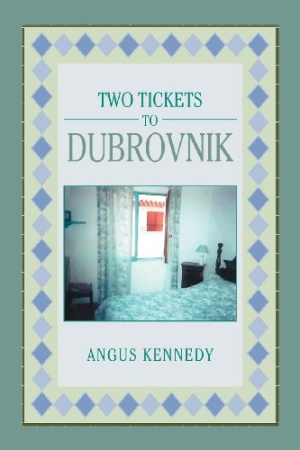Two Tickets to Dubrovnik
World travel offers abundant opportunities for visitors to explore the history, natural landscape, and culture of other countries. Underlying these attractions lies a complex mix of regional attitudes that are sometimes confusing to a traveler who doesn’t understand the subtleties of his host country’s mores.
In his debut novella, Angus Kennedy writes from knowledge gained during his career in the wine-making industry and through his interest in international travel. Two Tickets to Dubrovnik begins when Andrew Johnston, an Australian wine writer, finds two expired tickets to the Croatian city of Dubrovnik inexplicably left at his vacation home in France. The tickets remind him of a past trip to that city on the Adriatic Sea—a sojourn he remembers with pleasure and regret. Told in retrospect, Andrew arrives in Dubrovnik to finish writing a magazine article about the wines of the southern Rhone region of France and to explore historical landmarks of the ancient walled city. Intending the visit to be a solitary experience (and knowing only a few words of Croatian), he rents a small apartment for a month. Andrew’s solitude is soon interrupted when he encounters Lucien Delassales, a business acquaintance from France, and his attractive stepsister Niki. They both speak English and offer Andrew a tour of the city.
On their first day of touring, they come upon a memorial exhibition dedicated to the “Dubrovnik Defenders.” His guides act momentarily nonplussed when Andrew asks about it. Then Lucien explains that the exhibition commemorates the people who died during the war with Serbia. Revealing her Croatian birth, Niki adds, “It is in memory of the atrocities of 1991 and 1992 when so many of our people were massacred.”
Much of the book’s content consists of information about the region’s history, told from Andrew’s perspective and through his conversations with Lucien, Niki, and others. This extensive expository dialogue conveys numerous facts at the expense of actively showing the pertinent details of plot and character that define good fiction.
The morning after his first encounter with Niki’s brother Jakov, whose behavior overtly distresses her, Andrew goes for a walk near the harbor and notices several men by the water below him. Andrew says, “As they boarded the water taxi, one of them looked up and, to my eyes at least, looked straight at where I was standing, and I could have sworn it was Jakov.”
Kennedy writes in a serviceable, sometimes convoluted style about the historical origins of Croatia. Two Tickets to Dubrovnik is more travel guide and compendium of fine wines than a fictional tale of romance and intrigue. Andrew’s pursuit of love is more polite than passionate, and the mystery surrounding Jakov and Niki lacks sufficient tension to sustain interest. Qualifiers such as “a bit,” “somewhat,” and “quite” create a sense of indecisiveness; the use of cliché and occasional typographical errors also detract from the story.
People interested in Croatia’s complicated history will find this book appealing. Readers expecting a story of international intrigue may be less satisfied.
Reviewed by
Margaret Cullison
Disclosure: This article is not an endorsement, but a review. The publisher of this book provided free copies of the book and paid a small fee to have their book reviewed by a professional reviewer. Foreword Reviews and Clarion Reviews make no guarantee that the publisher will receive a positive review. Foreword Magazine, Inc. is disclosing this in accordance with the Federal Trade Commission’s 16 CFR, Part 255.

